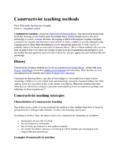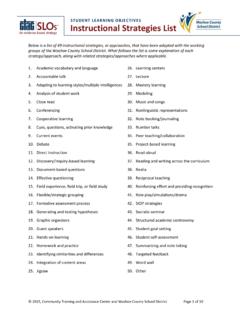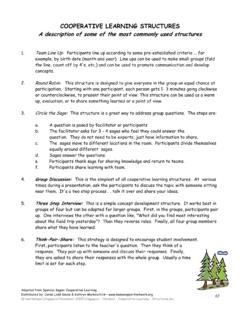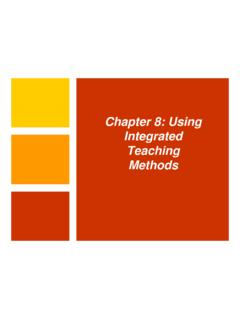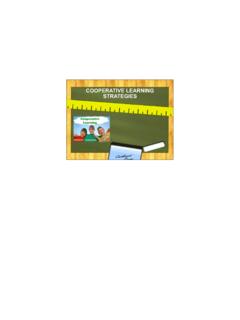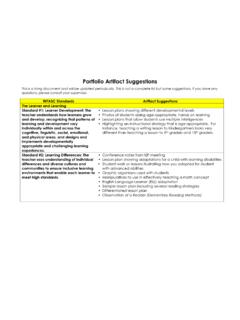Transcription of Constructivism (learning theory)
1 Constructivism ( learning theory). From Wikipedia, the free encyclopedia Constructivism is a theory of knowledge (epistemology)[1]. that argues that humans generate knowledge and meaning from an interaction between their experiences and their ideas. During infancy, it is an interaction between their experiences and their reflexes or behavior-patterns. Piaget called these systems of knowledge schemata. Constructivism is not a specific pedagogy, although it is often confused with constructionism, an educational theory developed by Seymour Papert, inspired by constructivist and experiential learning ideas of Jean Piaget.
2 Piaget's theory of constructivist learning has had wide ranging impact on learning theories and teaching methods in education and is an underlying theme of many education reform movements. Research support for constructivist teaching techniques has been mixed, with some research supporting these techniques and other research contradicting those results. History In past centuries, constructivist ideas were not widely valued due to the perception that children's play was seen as aimless and of little importance.
3 Jean Piaget did not agree with these traditional views, however. He saw play as an important and necessary part of the student's cognitive development and provided scientific evidence for his views. Today, constructivist theories are influential throughout much of the non-formal learning sector. One good example of constructivist learning in a non-formal setting is the Investigate Centre at The Natural History Museum, London. Here visitors are encouraged to explore a collection of real natural history specimens, to practice some scientific skills and make discoveries for themselves.
4 Writers who influenced Constructivism include: John Dewey (1859 1952). Maria Montessori (1870 1952). W adys aw Strzemi ski (1893 1952). Jean Piaget (1896 1980). Lev Vygotsky (1896 1934). Heinz von Foerster (1911 2002). Jerome Bruner (1915-). Herbert Simon (1916 2001). Paul Watzlawick (1921 2007). Ernst von Glasersfeld (1917 2010). Edgar Morin (1921-). For more detailed information on the philosophy of the construction of human knowledge, see constructivist epistemology. Constructivist theory Formalization of the theory of Constructivism is generally attributed to Jean Piaget, who articulated mechanisms by which knowledge is internalized by learners.
5 He suggested that through processes of accommodation and assimilation, individuals construct new knowledge from their experiences. When individuals assimilate, they incorporate the new experience into an already existing framework without changing that framework. This may occur when individuals'. experiences are aligned with their internal representations of the world, but may also occur as a failure to change a faulty understanding; for example, they may not notice events, may misunderstand input from others, or may decide that an event is a fluke and is therefore unimportant as information about the world.
6 In contrast, when individuals' experiences contradict their internal representations, they may change their perceptions of the experiences to fit their internal representations. According to the theory, accommodation is the process of reframing one's mental representation of the external world to fit new experiences. Accommodation can be understood as the mechanism by which failure leads to learning : when we act on the expectation that the world operates in one way and it violates our expectations, we often fail, but by accommodating this new experience and reframing our model of the way the world works, we learn from the experience of failure, or others' failure.
7 It is important to note that Constructivism is not a particular pedagogy. In fact, Constructivism is a theory describing how learning happens, regardless of whether learners are using their experiences to understand a lecture or following the instructions for building a model airplane. In both cases, the theory of Constructivism suggests that learners construct knowledge out of their experiences. However, Constructivism is often associated with pedagogic approaches that promote active learning , or learning by doing.
8 There are many critics of " learning by doing" ( "discovery learning ") as an instructional strategy ( see the criticisms below).[2][3] While there is much enthusiasm for Constructivism as an design strategy, according to Tobias and Duffy ".. to us it would appear that Constructivism remains more of a philosophical framework than a theory that either allows us to precisely describe instruction or prescribe design strategies.( )".[2] This is unfortunate because there is quite a bit of promise to the educational philosophy behind Constructivism , but constructivists seem to be having difficulties defining testable learning theories.
9 In part this is due to Piaget's distrust of empirical methods and reliance upon the clinical method. Constructivist learning intervention The nature of the learner The learner as a unique individual Social Constructivism views each learner as a unique individual with unique needs and backgrounds. The learner is also seen as complex and multidimensional. Social Constructivism not only acknowledges the uniqueness and complexity of the learner, but actually encourages, utilizes and rewards it as an integral part of the learning process (Wertsch 1997).
10 The importance of the background and culture of the learner Social Constructivism or socioculturalism encourages the learner to arrive at his or her version of the truth, influenced by his or her background, culture or embedded worldview. Historical developments and symbol systems, such as language, logic, and mathematical systems, are inherited by the learner as a member of a particular culture and these are learned throughout the learner's life. This also stresses the importance of the nature of the learner's social interaction with knowledgeable members of the society.
